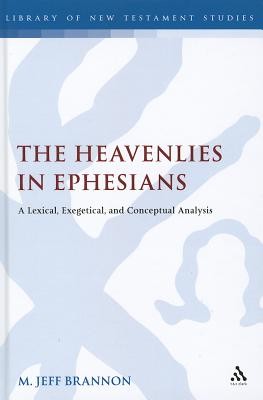
- We will send in 10–14 business days.
- Author: M Jeff Brannon
- Publisher: CONTINNUUM 3PL
- ISBN-10: 0567577414
- ISBN-13: 9780567577412
- Format: 15.8 x 23.6 x 2.5 cm, hardcover
- Language: English
- SAVE -10% with code: EXTRA
Reviews
Description
The expression "in the heavenlies" appears five times in Ephesians and is not found at any other point in the New Testament. The two appearances which have provoked the most debate are the session of earthly believers in 2:6 and the presence of the spiritual forces of evil in 6:12.
M. Jeff Brannon conducts a lexical, exegetical, and conceptual analysis of the expression arguing against the prevailing interpretation of the term and provides in-depth examinations of three significant concepts associated with it; namely the redeemed on earth having a heavenly status, evil powers in heaven, and the cosmology of Ephesians. Brannon uses a wide range of souces; Greek, Jewish, the Apostolic Fathers, and the Septuagint. Brannon concludes that there is no basis for a distinction between the terms 'heavens' and 'in the heavenlies' in Ephesians . He also asserts that Qumran and apocalyptic texts can shed light upon and assist in a proper understanding of the difficult passages in which the expression appears.
EXTRA 10 % discount with code: EXTRA
The promotion ends in 21d.02:09:04
The discount code is valid when purchasing from 10 €. Discounts do not stack.
- Author: M Jeff Brannon
- Publisher: CONTINNUUM 3PL
- ISBN-10: 0567577414
- ISBN-13: 9780567577412
- Format: 15.8 x 23.6 x 2.5 cm, hardcover
- Language: English English
The expression "in the heavenlies" appears five times in Ephesians and is not found at any other point in the New Testament. The two appearances which have provoked the most debate are the session of earthly believers in 2:6 and the presence of the spiritual forces of evil in 6:12.
M. Jeff Brannon conducts a lexical, exegetical, and conceptual analysis of the expression arguing against the prevailing interpretation of the term and provides in-depth examinations of three significant concepts associated with it; namely the redeemed on earth having a heavenly status, evil powers in heaven, and the cosmology of Ephesians. Brannon uses a wide range of souces; Greek, Jewish, the Apostolic Fathers, and the Septuagint. Brannon concludes that there is no basis for a distinction between the terms 'heavens' and 'in the heavenlies' in Ephesians . He also asserts that Qumran and apocalyptic texts can shed light upon and assist in a proper understanding of the difficult passages in which the expression appears.


Reviews